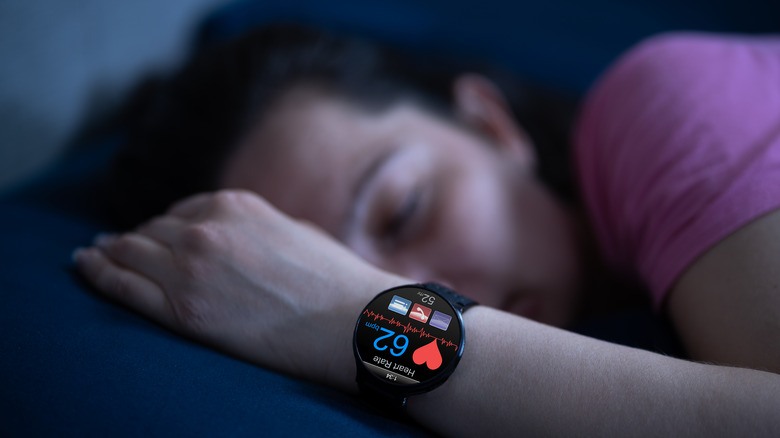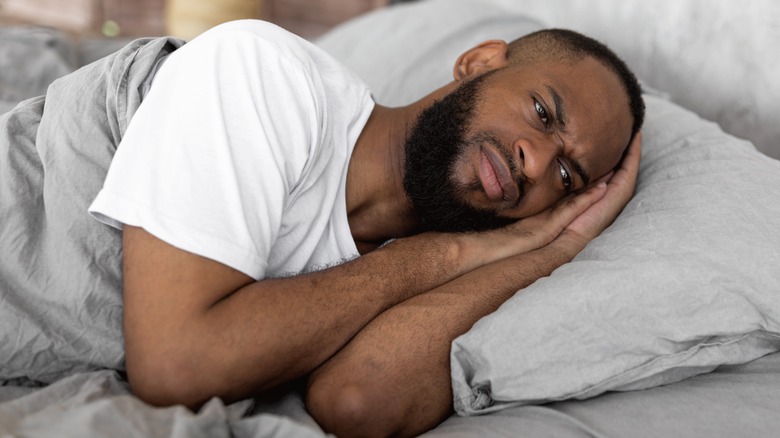Sleep Mistakes That Can Raise Your Cholesterol
Some sleep habits are great for our health, such as sticking to a set bedtime, limiting blue light exposure, and steering clear of coffee or alcohol several hours before turning in for the night. Other sleep habits, however, can work against us and be detrimental to our health. This includes getting too little sleep, as well as getting way too much sleep, both of which may put one at risk for high cholesterol (via Sleep).
When you get your blood drawn at your annual physical exam, the doctor will measure your high-density lipoprotein (HDL) cholesterol and your low-density lipoprotein (LDL) cholesterol. HDL is informally referred to as the "good" cholesterol, while LDL is the "bad" cholesterol that you want to keep low (via WebMD). Stress, smoking, a diet high in saturated fats, and leading a sedentary lifestyle can all contribute to high cholesterol. As it turns out, poor sleep can, too. The U.S. Centers for Disease Control and Prevention (CDC) advises that adults between the ages of 18 and 60 should be getting seven or more hours of sleep nightly — but not too much more. While a lack of sleep may raise our cholesterol, studies have shown that hitting snooze one too many times may do the same.
This risks of too much or too little sleep
Researchers from the previously referenced 2008 study published in Sleep used survey data from Japanese residents to assess participants' physical status, dietary intake, and lifestyle habits, including approximately how many hours of sleep they had gotten each night for the last month. The questionnaire data, combined with patient blood test results, revealed that women were more susceptible to high triglyceride levels or lower amounts of "good" cholesterol if they slept fewer than 5 hours a night or 8 or more hours nightly. Oppositely, men who received an average of 8 or more hours of sleep nightly were found to have a lower risk of high "bad" cholesterol levels.
The underlying cause of this relationship between sleep and cholesterol is not entirely understood, particularly in regards to longer sleep durations. While more research is still needed, the study team theorizes that differences in sex hormones between men and women as well as metabolism function may be involved. This claim was echoed by cardiologist Dr. Nivee Amin, who told Prevention, "Our cholesterol metabolism occurs at night. And so that's why a lot of times the medications we take for cholesterol are prescribed to be taken at bedtime." However, both under-sleeping and over-sleeping interfere with this process. With regard to over-sleeping specifically, the presence of alternate health conditions, such as obesity or high blood pressure, has also been associated with longer periods of sleep and may play a role in this connection.
The link between cholesterol and sleep
The relationship between a lack of sleep and high cholesterol risk appears to be a bit more established. In a 2016 study published in Scientific Reports, researchers found that inadequate sleep prompted inflammation in the body and reduced gene expression of what's known as reverse cholesterol transport from macrophages. Researchers from a 2017 study published in the scientific journal Endocrinology and Metabolism explain that this is the process by which cholesterol is rerouted to the liver and expelled from the body as waste. This helps maintain a healthy balance of cholesterol in the body and lessens the risk of plaque buildup in the arteries, which can lead to cardiovascular issues. However, the findings of the 2016 study found that sleep restriction hindered this process.
Dr. Amin told Prevention that while sleep itself is important, it can also affect our cholesterol levels in more indirect ways, too. If you're getting a proper amount of sleep, you're more likely to wake up the next day feeling recharged and refreshed and, subsequently, more inclined towards additional healthy habits like exercise.



